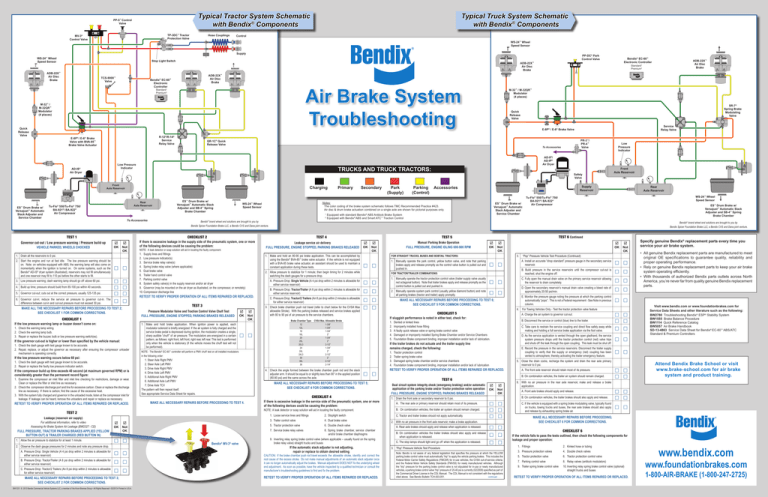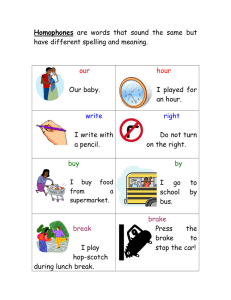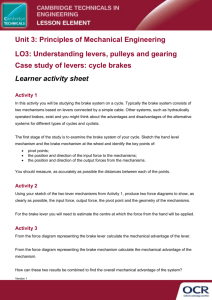
Typical Truck System Schematic
with Bendix® Components
Typical Tractor System Schematic
with Bendix® Components
PP-5™ Control
Valve
TP-3DC™ Tractor
Protection Valve
MV-3®
Control Valve
Hose Couplings
Control
WS-24™ Wheel
Speed Sensor
&
6
Supply
PP-DC® Park
Control Valve
™
WS-24 Wheel
Speed Sensor
Stop Light Switch
ADB-22X™
Air Disc
Brake
TCS-9000™
Valve
®
Bendix EC-60
Electronic
Controller
ADB-22X™
Air Disc
Brake
R-12®/R-14®
Service
Relay Valve
Quick
Release
Valve
Service
Relay Valve
E-8P® / E-6® Brake Valve
PR-3™/
PR-4™
Valve
QR-1C® Quick
Release Valve
Low Pressure
Indicator
TRUCKS AND TRUCK TRACTORS:
Safety
Valve
Charging
Rear
Axle Reservoir
Tu-Flo® 550/Tu-Flo® 750/
BA-921®/ BA-922®
Air Compressor
ES™ Drum Brake w/
Versajust™ Automatic Slack
Adjuster and SB-4™ Spring
Brake Chamber
2
To Accessories
Governor cut-out / Low pressure warning / Pressure build-up
VEHICLE PARKED, WHEELS CHOCKED
þ
OK
Not
OK
2. Start the engine and run at fast idle. The low pressure warning should be
on. Note: on vehicles equipped with ABS, the warning lamp will also come on
momentarily when the ignition is turned on. On some systems, such as the
Bendix® AD-IS® dryer system (illustrated), reservoirs may not fill simultaneously
and one reservoir may fill to 110 psi before the other starts to fill.
3. Low pressure warning; dash warning lamp should go off above 60 psi.
4. Build up time; pressure should build from 85-100 psi within 40 seconds.
5. Governor cut-out; cuts out at the correct pressure, usually 125-135 psi.
If there is excessive leakage in the supply side of the pneumatic system, one or more
of the following devices could be causing the problem:
NOTE: A leak detector or soap solution will aid in locating the faulty component.
CHECKLIST 1
If the low pressure warning lamp or buzzer doesn’t come on:
1. Check the warning lamp wiring.
2. Check the warning lamp bulb.
3. Repair or replace the buzzer, bulb or low pressure warning switch(es).
If the governor cut-out is higher or lower than specified by the vehicle manual:
1. Check the dash gauge with test gauge known to be accurate.
2. Repair, replace, or adjust the governor as necessary after ensuring the compressor unloader
mechanism is operating correctly.
If the low pressure warning occurs below 60 psi:
1. Check the dash gauge with test gauge known to be accurate.
2. Repair or replace the faulty low pressure indicator switch.
If the compressor build up time exceeds 40 second (at maximum governed RPM) or is
considerably greater than the permanent record figure:
1. Examine the compressor air inlet filter and inlet line checking for restrictions, damage or wear.
Clean or replace the filter or inlet line as necessary.
2. Check the compressor discharge port and line for excessive carbon. Clean or replace the discharge
line as necessary. If there is carbon, find the cause of the excessive heat.
3. With the system fully charged and governor in the unloaded mode, listen at the compressor inlet for
leakage. If leakage can be heard, remove the unloaders and repair or replace as necessary.
RETEST TO VERIFY PROPER OPERATION OF ALL ITEMS REPAIRED OR REPLACED.
Pressure Modulator Valve and Traction Control Valve Chuff Test
þ
þ
FULL PRESSURE, ENGINE STOPPED, PARKING BRAKES RELEASED
OK
Not
OK
1. Make and hold brake application. When ignition power is applied, each
modulator solenoid is briefly energized. If the air system is fully charged and the
service brake pedal is depressed during ignition, the modulator creates a single,
sharp audible “chuff” of air pressure. The modulators are energized in a certain
pattern, as follows: right front, left front, right rear, left rear. This test is performed
only when the vehicle is stationary (if the vehicle moves the chuff test will not
be performed).
NOTE: The Bendix® EC-60™ controller will perform a PMV chuff test on all installed modulators
in the following order:
1. Steer Axle Right PMV
2. Steer Axle Left PMV
3. Drive Axle Right PMV
4. Drive Axle Left PMV
5. Additional Axle Right PMV
6. Additional Axle Left PMV
7. Drive Axle TCV
The pattern will then repeat itself.
See appropriate Service Data Sheet for repairs.
þ
þ
OK
Not
OK
FULL PRESSURE, TRACTOR PARKING BRAKES APPLIED (YELLOW
BUTTON OUT) & TRAILER CHARGED (RED BUTTON IN)
A. Pressure Drop: Single Vehicle (A 4 psi drop within 2 minutes is allowable for
either service reservoir)
B. Pressure Drop: Tractor/Trailer (A 6 psi drop within 2 minutes is allowable for
either service reservoir)
C. Pressure Drop: Tractor/2 Trailers (An 8 psi drop within 2 minutes is allowable
for either service reservoir)
MAKE ALL NECESSARY REPAIRS BEFORE PROCEEDING TO TEST 3;
SEE CHECKLIST 2 FOR COMMON CORRECTIONS.
BW1231 © 2013 Bendix Commercial Vehicle Systems LLC, a member of the Knorr-Bremse Group • All Rights Reserved • 02/2013• Printed in U.S.A.
Leakage service air delivery
þ
þ
Manual Parking Brake Operation
FULL PRESSURE, ENGINE STOPPED, PARKING BRAKES RELEASED
OK
Not
OK
FULL PRESSURE, ENGINE IDLING 600-900 RPM
WS-24™ Wheel
Speed Sensor
ES™ Drum Brake w/
Versajust™ Automatic Slack
Adjuster and SB-4™ Spring
Brake Chamber
2. Manually operate system park control (usually yellow diamond button) and note
all parking brakes (tractor and trailer) apply promptly.
C. Pressure Drop: Tractor/2 Trailers (An 8 psi drop within 2 minutes is allowable
for either service reservoir)
1.
2.
3.
4.
5.
Bendix® MV-3® valve
5. Tractor protection valve
6. Double check valve
7. Service brake relay valves
8. Spring brake chamber, service chamber
and/or brake chamber diaphragms
9. Inverting relay spring brake control valve (where applicable – usually found on the spring
brake relay valve) straight trucks and buses
If the automatic slack adjuster is not adjusting,
repair or replace to obtain desired setting.
CAUTION: If the brake chamber push rod travel exceeds the allowable stroke, identify and correct the
root cause of the excess stroke. Do not make manual adjustments of an automatic slack adjuster once
it can no longer automatically adjust the brakes. Manual adjustment DOES NOT fix the underlying wheel
end adjustment. As soon as possible, have the vehicle inspected by a qualified technician or consult the
manufacturer’s troubleshooting guidelines to find and fix the problem.
RETEST TO VERIFY PROPER OPERATION OF ALL ITEMS REPAIRED OR REPLACED.
Not
OK
3.
1.
2.
3.
4.
“Pop” Pressure Vehicle Test Procedure (Continued)
A. Install an accurate “shop standard” pressure gauge in the secondary service
reservoir.
B. Build pressure in the service reservoirs until the compressor cut-out is
reached, shut the engine off.
C. Fully open the manual drain valve on the primary service reservoir allowing
the reservoir to drain completely.
D. Open the secondary reservoir’s manual drain valve creating a bleed rate of
approximately 20-50 psi/min.
E. Monitor the pressure gauge noting the pressure at which the parking control
automatically “pops”. This is not a Federal requirement - See Note in previous
column.
For Towing Vehicles Only - Test the tractor protection valve feature
A. Charge the air system to governor cut-out.
B. Disconnect the service or control (blue) line to the trailer.
C. Take care to restrain the service coupling and direct flow safely away while
making and holding a full service brake application via the foot valve.
D. As the service application is vented through the open gladhand, the service
system pressure drops until the tractor protection control (red) valve trips
and shuts off the leak through the open coupling. This leak must be shut off.
If the trailer brakes do not actuate and the trailer supply line
remains charged, check the following:
Specify genuine Bendix® replacement parts every time you
service your air brake system.
• All genuine Bendix replacement parts are manufactured to meet
original OE specifications to guarantee quality, reliability and
proper operating performance.
• Rely on genuine Bendix replacement parts to keep your air brake
system operating efficiently.
• With thousands of authorized Bendix parts outlets across North
America, you’re never far from quality genuine Bendix replacement
parts.
Visit www.bendix.com or www.foundationbrakes.com for
Service Data Sheets and other literature such as the following:
BW2780 Troubleshooting Bendix® ESP® Stability System
BW1555 Brake Balance Procedure
BW1114 Quick Reference Catalog
BW5057 Air Brake Handbook
SD-13-4863 Service Data Sheet for Bendix® EC-60™ ABS/ATC
Standard & Premium Controllers
E. Record the pressure in the service reservoirs. Disconnect the trailer supply
coupling to verify that the supply or emergency (red) coupling has been
vented to atmosphere, thereby activating the trailer emergency feature.
Tractor protection control
Trailer spring brake valve
Damaged spring brake chamber and/or service chambers
Foundation brake component binding, improper installation and/or lack of lubrication
5. Close the drain cocks, recharge the system and drain the rear axle primary
reservoir to 0 psi.
RETEST TO VERIFY PROPER OPERATION OF ALL ITEMS REPAIRED OR REPLACED.
A. The front axle reservoir should retain most of its pressure.
B. On combination vehicles, the trailer air system should remain charged.
Attend Bendix Brake School or visit
www.brake-school.com for air brake
system and product training.
TEST 6
Dual circuit system integrity check (emergency braking) and/or automatic
application of the parking brake and/or Tractor protection valve operation
þ
þ
OK
Not
OK
1. Drain the front axle or secondary reservoir to 0 psi.
B. On combination vehicles, the trailer air system should remain charged.
4. Dual brake valve
OK
Dented or kinked lines
Improperly installed hose fitting
A faulty quick release valve or spring brake control valve
Damaged or improperly installed Spring Brake Chamber and/or Service Chambers
Foundation Brake component binding, improper installation and/or lack of lubrication.
NOTE: A leak detector or soap solution will aid in locating the faulty component.
3. Trailer control valve
Not
OK
If sluggish performance is noted in either test, check for:
A. The rear axle or primary reservoir should retain most of its pressure.
2. Stoplight switch
OK
CHECKLIST 5
If there is excessive leakage in the service side of the pneumatic system, one or more
of the following devices could be causing the problem:
1. Loose service lines and fittings
þ
4.
FULL PRESSURE, ENGINE STOPPED, PARKING BRAKES RELEASED
MAKE ALL NECESSARY REPAIRS BEFORE PROCEEDING TO TEST 4.
þ
MAKE ALL NECESSARY REPAIRS BEFORE PROCEEDING TO TEST 6;
SEE CHECKLIST 5 FOR COMMON CORRECTIONS.
3. Check brake chamber push rod travel (refer to chart below for the CVSA Max
allowable Stroke). With the parking brakes released and service brakes applied
with 80 to 90 psi of air pressure to the service chambers.
CHECKLIST 4
þ
FOR TRACTOR/TRAILER COMBINATIONS:
B. Pressure Drop: Tractor/Trailer (A 6 psi drop within 2 minutes is allowable for
either service reservoir)
CVSA Max. Allowable Stroke
1-3/8”
1-3/4”
1-3/4”
2”
1-3/4”
2”
2-1/2”
1-3/4”
2”
2-1/2”
2”
2-1/2”
2-1/4”
þ
1. Manually operate the park control, yellow button valve, and note that parking
brakes apply and release promptly as the control valve button is pulled out and
pushed in.
1. Manually operate the tractor protection control valve (trailer supply valve usually
red octagonal button). Note that trailer brakes apply and release promptly as the
control button is pulled out and pushed in.
Brake Chamber Type
12
12L
16
16L
20
20L
20L3
24
24L
24L3
30
30L
36
TEST 6 Continued
FOR STRAIGHT TRUCKS, BUSES AND BOBTAIL TRACTORS:
A. Pressure Drop: Single Vehicle (A 4 psi drop within 2 minutes is allowable for
either service reservoir)
MAKE ALL NECESSARY REPAIRS BEFORE PROCEEDING TO TEST 5;
SEE CHECKLIST 4 FOR COMMON CORRECTIONS.
1. Allow the air pressure to stabilize for at least 1 minute.
2. Observe the dash gauge pressures for 2 minutes and note any pressure drop.
ES™ Drum Brake w/
Versajust™ Automatic
Slack Adjuster and
Service Chamber
Rear
Axle Reservoir
Tu-Flo® 550/Tu-Flo® 750/
BA-921®/ BA-922®
Air Compressor
TEST 5
4. Check the angle formed between the brake chamber push rod and the slack
adjuster arm. It should be equal to or slightly less than 90° in the applied position
(80-90 psi) and the same across the axle.
TEST 2
Leakage (reservoir air supply)
For additional information, refer to video
Assessing Air Brake System Air Leakage (BW2327 - CD)
Supply
Reservoir
Accessories
Bendix® brand wheel end solutions are brought to you by
Bendix Spicer Foundation Brake LLC, a Bendix CVS and Dana joint venture.
2. Allow pressure to stabilize for 1 minute; then begin timing for 2 minutes while
watching the dash gauges for a pressure drop.
TEST 3
MAKE ALL THE NECESSARY REPAIRS BEFORE PROCEEDING TO TEST 2;
SEE CHECKLIST 1 FOR COMMON CORRECTIONS.
Parking
(Control)
Equipped with standard Bendix® ABS Antilock Brake System
Equipped with Bendix® ABS and Smart ATC™ Traction Control
1. Make and hold an 80-90 psi brake application. This can be accomplished by
using the Bendix® BVA-85™ brake valve actuator. If the vehicle is not equipped
with a BVA-85 brake valve actuator, an assistant should be used to maintain a
constant application during these tests.
RETEST TO VERIFY PROPER OPERATION OF ALL ITEMS REPAIRED OR REPLACED.
6. Governor cut-in; reduce the service air pressure to governor cut-in. The
difference between cut-in and cut-out pressure must not exceed 30 psi.
Park
(Supply)
TEST 4
1. Supply lines and fittings
2. Low pressure indicator(s)
3. Service brake relay valve(s)
4. Spring brake relay valve (where applicable)
5. Dual brake valve
6. Trailer hand control valve
7. Parking control valve
8. System safety valve(s) in the supply reservoir and/or air dryer
9. Governor (may be mounted on the air dryer as illustrated, on the compressor, or remotely)
10. Compressor discharge line
1. Drain all the reservoirs to 0 psi.
Secondary
Front
Axle Reservoir
Bendix® brand wheel end solutions are brought to you by
Bendix Spicer Foundation Brake LLC, a Bendix CVS and Dana joint venture.
CHECKLIST 2
þ
Primary
Notes:
The color coding of the brake system schematic follows TMC Recommended Practice #423.
Air disc & drum brake actuation combined on a single axle are shown for pictorial purposes only.
WS-24™ Wheel
Speed Sensor
1
TEST 1
Low
Pressure
Indicator
AD-9®/
AD-IP®
Air Dryer
Front
Axle Reservoir
ES Drum Brake w/
Versajust™ Automatic
Slack Adjuster and
Service Chamber
SR-7®
Spring Brake
Modulating
Valve
To Accessories
AD-IS®
Air Dryer
™
Standard1
Premium2
M-32™ / M-32QR™
Modulator
(4 places)
Air Brake System
Troubleshooting
M-32™ /
M-32QR™
Modulator
(4 places)
E-8P® / E-6® Brake
Valve with BVA-85™
Brake Valve Actuator
ADB-22X™
Air Disc
Brake
ADB-22X™
Air Disc
Brake
™
Standard1
Premium2
Quick
Release
Valve
Bendix® EC-60™
Electronic Controller
6. With no air pressure in the rear axle reservoir, make and release a brake
application.
A. Front axle brakes should apply and release.
B. On combination vehicles, the trailer brakes should also apply and release.
C. If the vehicle is equipped with a spring brake modulating valve, typically found
on trucks, towing trucks and buses, the rear axle brakes should also apply
and release by exhausting spring brake air.
C. Tractor and trailer brakes should not apply automatically.
MAKE ALL NECESSARY REPAIRS BEFORE PROCEEDING;
SEE CHECKLIST 6 FOR COMMON CORRECTIONS.
2. With no air pressure in the front axle reservoir, make a brake application.
A. Rear axle brakes should apply and release when application is released.
B. On combination vehicles the trailer brakes should also apply and release
when application is released.
C. The stop lamps should light and go off when the application is released.
3. “Pop” Pressure Vehicle Test Procedure
Note: Bendix is not aware of any federal legislation that specifies the pressure at which the YELLOW
parking brake control valve must automatically “trip” to apply the vehicle parking brakes. This includes the
Federal Motor Carrier Safety Regulations (FMCSR) for in-use vehicles, the CVSA out-of-service criteria,
and the Federal Motor Vehicle Safety Standards (FMVSS) for newly manufactured vehicles. Although
the “trip” pressure for the parking brake control valve is not stipulated for in-use or newly manufactured
vehicles, a parking brake control valve “trip” pressure of 20-40 psi is currently (02/2009) specified as part of
the Commercial Driver License in the CDL Manual. The CDL Manual is not consistent with the regulations
cited above. See Bendix Bulletin TCH-003-051.
continued . . .
CHECKLIST 6
If the vehicle fails to pass the tests outlined, then check the following components for
leakage and proper operation:
1. Fittings
2. Kinked hose or tubing
3. Pressure protection valves
4. Double check valves
5. Tractor protection valve
6. Tractor protection control valve
7. Parking control valve
8. Relay valves (antilock modulators)
9. Trailer spring brake control valve
10. Inverting relay spring brake control valve (optional)
straight trucks and buses
RETEST TO VERIFY PROPER OPERATION OF ALL ITEMS REPAIRED OR REPLACED.
www.bendix.com
www.foundationbrakes.com
1-800-AIR-BRAKE (1-800-247-2725)


